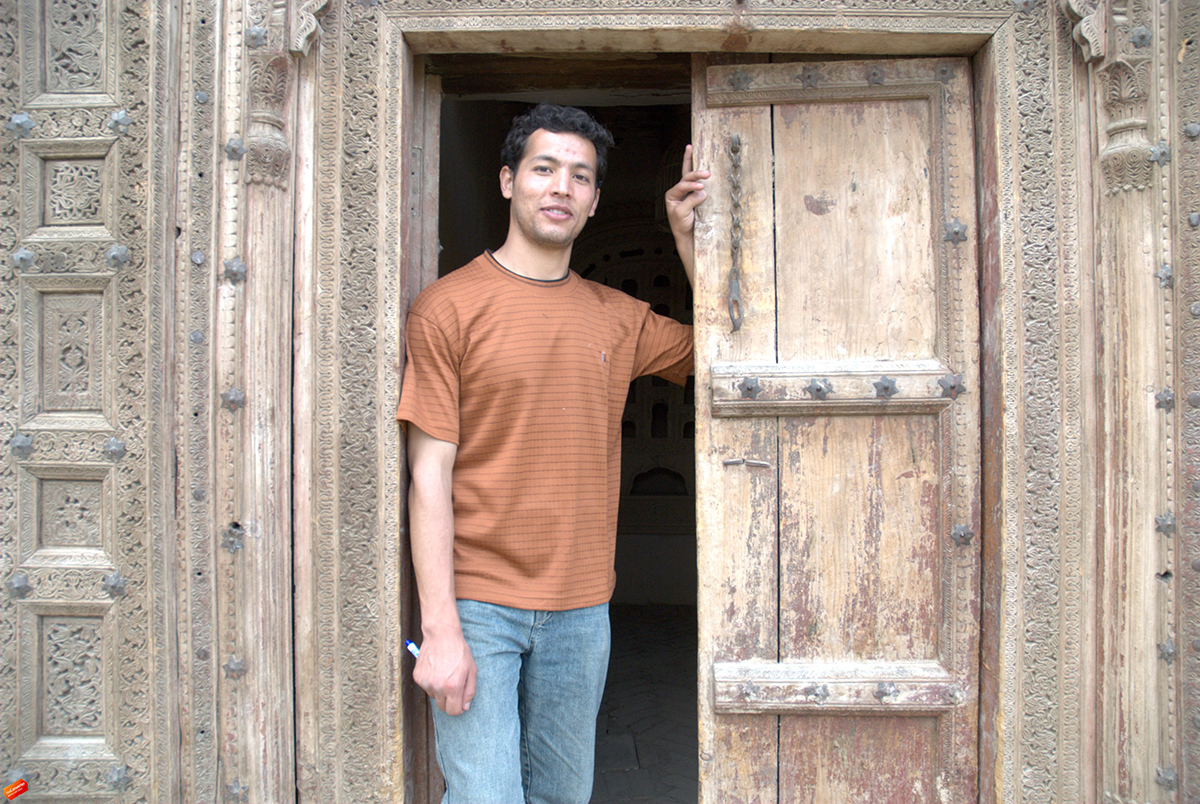Q&A: Qais Akbar Omar, Author of A Fort of Nine Towers

Photo Provided
How do you hope to spend this year at Harvard?
I don’t have my carpet business this year, and in Afghanistan I am quite busy with my carpet business. I now see that there is so much lack of knowledge about Afghanistan. Just talking to people and hearing what they have to say, their knowledge basically comes from TV and the media, which is not a good way to learn about the country, because it only focuses on the leaders. But there’s a lot of other things going on. And there’s a culture—even with war, and America’s war in Afghanistan is misinterpreted in many ways here. So I decided to go ahead and write other books. I’ve started three books. One is a novel. It’s about the countryside in the north before the Russians invaded Afghanistan, and the second half is about when the Russians invaded Afghanistan and everything changes. The other novel goes way way back to the 1800s; it’s a very historical novel. I’m doing a lot of research for it. The third book is a sequel to A Fort of Nine Towers.
You mentioned American misconceptions of Afghanistan. Can you give me some examples?
Yes, there are many. They don’t exactly understand how Afghan society works. One example: Before 9/11, Americans wanted Osama bin Laden from Afghanistan. And the Taliban did not give him up. Why? Because there is an Afghan culture called shelter. Suppose you are my enemy and you killed my brother, and now I am going to kill you as well. But you run and you go to my uncle’s house for shelter. You become untouchable. That’s legal. That’s how Afghan society works. If someone comes to your house for shelter, even if he is your enemy, you give him shelter. Osama bin Laden—that’s how he came to Afghanistan looking for shelter. So the Taliban could not give him up.
Another example I can give you, honor is something that people die for in Afghanistan. You can be dirt poor and suffering from poverty and all other sorts of problems, but honor is the most important thing. You can’t touch my woman for example—my sister or my wife or my mom. So the Americans would just barge into people’s houses and start searching the women. Again, that’s you striking my honor, and if you strike my honor I am going to kill you. People have killed each other for honor for centuries, and you have feuds going on and on. That’s part of the very extreme part of the culture.
Another example: In Afghanistan, when we have a dispute you talk about it for days, weeks, months, years, until everybody walks out of the room happy and winning. There is no winner or loser. While Americans, for example, go and fight the Taliban or other groups. Now if an Afghan Taliban dies, that guy belongs to a family, and that family belongs to a tribe. If he dies, imagine how many people will hate the Americans. If you estimate a family as nine people, you create nine enemies by killing one Taliban. War is not the way to bring peace.
And you hope your novels will play some role in conveying these differences?
Exactly, to express all of these ideas. To express how society and how people in reality work, how society runs. To give people a broad description of all of this. To fill the gaps in people’s knowledge, whether it has to do with politics or people just understanding the country, and so on.
Why did you choose to change forms, from memoir to fiction?
Nonfiction, very few people actually read. Because people have the tendency of picking up a novel that engages them with elements that they find in common with their lives, like family, like emotions. And so that’s why [nonfiction is] hard. I wanted to go with fiction because it reaches a broader experience. And that will help people understand. These books do not focus on my family. One is a work of fiction set in northern Afghanistan, but all these ideas I told you about are laid out there. The second one is a historical novel so people understand what Afghans were suffering back then. If you study Afghan history, Afghanistan has always been used as a chessboard between different superpowers. The English wanted to fight Russians, and the Afghans were caught in between. Then during the Cold War, there was a hot war in Afghanistan. Because all of these powers were coming into our country and we had to fight at both ends. And now the same thing is happening. Americans are there but so many other countries don’t want America to be there, like Iran, like Russia, because they feel threatened, like Pakistan because of India. So now Afghanistan is caught between all these clashes, between all these superpowers. I want to bring all of this into the novel.
And you believe literature can have an impact on such vast geopolitical affairs?
It can have a huge impact. Look what The Kite Runner did. Everyone knows about The Kite Runner, everyone has read it. It’s a great book, but we need more.
What are your thoughts on the upcoming deadline for the presidential inauguration?
For centuries we have solved our problems through jirgas and shoras, which means the heads of the tribes get together and talk until they find a solution so everyone benefits from it and is satisfied. With this election, it took a lot longer than expected, but then that is also the Afghan way of doing things. We take our time. Once both Ghani’s and Abdullah’s teams figure out everything between themselves and get to the office, we are hoping that things will come back to normal. Then we will take a deep breath and relax.
How do you find Afghan literature or culture in particular to have influenced your own work?
Everybody tells me that I am a good storyteller, but I am not the only one. The only thing I did is that I tried to apply that storytelling to the English language. Otherwise, everybody in Afghanistan is a storyteller, because that’s the culture. That’s how people are brought up. Everybody in Afghanistan is a poet, because the way they talk is very poetic, like the plays of Shakespeare. Our language has that kind of authenticity. Shakespeare sounds like Rumi’s poems, if you read them in Dari.
Do you feel that your identity has shifted from running a carpet business full-time to becoming a full-time writer?
Every time I get introduced as a “writer” or “author,” it kind of makes me giggle. I’m a writer? I never thought of being a writer. Of course, my grandfather was a great writer. He published a lot of short stories and newspaper articles. My grandfather on my mother’s side as well, he did the same thing. But in our family we don’t think of ourselves as writers because we were brought up as businessmen. You have to go and make money and change the way of business, become proper businessmen, not traders going from village to village. So that was how we were brought up. I grew up thinking I was going to be a businessman like my father. And I still am. I’m still young. I hope to get as big as my grandfather one day.
So you plan on reopening the carpet business someday?
So many times everything was stolen from us, or burned from a rocket landing on the business, and we had to start from zero. So we can start from zero again. We have done it many times. We know how to do it all over again. If you have the will, you succeed.
And you’re still planning to return to Afghanistan when the political situation permits?
I’m still hoping. Since I came to America, people have been so nice, so kind. You have a saying that there’s no such thing as free lunch. That’s so wrong—I’ve been getting free lunch all the time. In Afghanistan, it’s so dusty because of the years of drought; here, it’s so green and so fresh. This country, the system, is so great—everything works properly.
But still, I look around, and I don’t say that this is mine. In Afghanistan, I wake up and from my window I can see the mountains. I’ve never climbed those mountains, not even once in my life. But I wake up every morning, and I look at them, and I have this feeling of ownership. I haven’t felt that way in America yet. Maybe after spending some time, that feeling will come. I have Afghans who have lived here for 20, 30 years now tell me, “One day you’ll wake up and you will feel like I have to make my peace, and this is my place. It will happen to you. But it may take a long time, it may take a short time, it depends from person to person.” It hasn’t happened to me. That’s why I want to go back. We are a very optimistic people. We think everything will be all right in the end. Afghanistan will be peaceful, we will go back, we’ll have our family, we will sit around our tablecloth on the floor like we always do, and we’ll have our feast three times a day—breakfast, lunch, dinner—and there will be 50, 60 people sitting around the tablecloth, and the dinner will last for three hours, and we will talk about many things, and then we will have poetry contests, recite verses from Hafiz and Omar-e-Khayyam. It goes on for hours. There’s the storytelling. I want to be a part of that world again. That is where I grew up, and that’s where I feel at home.
This interview has been condensed and edited for clarity.


